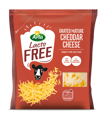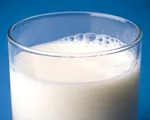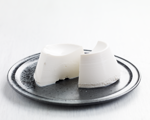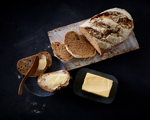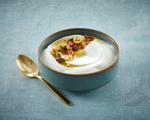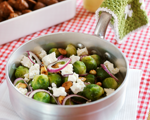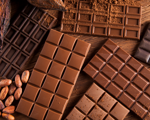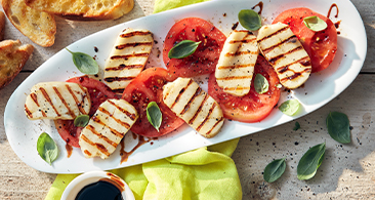
No, halloumi is not lactose-free. As with most dairy cheeses, halloumi contains the naturally occurring milk sugar known as lactose because it is made of goat’s milk and sheep’s milk.
However, you can find tasty lactose-free halloumi options that are processed specifically to remove all lactose.
What is hallloumi cheese?
Halloumi is a delightful semi-soft, brined cheese from Cyprus, well-known for its unique texture that is often described as squeaky. It is perfect for grilling or frying on high heat to create an irresistibly crispy, browned exterior.
It is traditionally made from a mixture of sheep's and goat's milk. Some types may contain cow's milk as well. The Cypriot cheese is known for its distinct salty and tangy taste, which is pronounced without being overpowering, as well as its nutty, creamy undertones.

How much lactose is in halloumi cheese?
Halloumi contains about 2 grams of lactose per 100 grams. The lactose content is influenced by, among other things, the specific types of milk used. It is made from sheep's milk and goat's milk, which boasts a lower lactose content than, for example, cow's milk, making the lactose content in halloumi slightly lower than similar cheeses made from cow's milk.
However, more than the milk source goes into defining the lactose content. The brining process, with its high salt concentration, helps to extract some of the whey, which is where a good deal of milk's lactose resides. By reducing the whey content through this process, the lactose content of halloumi is further moderated.
Additionally, halloumi undergoes an initial fermentation stage before brining. During this period, beneficial bacteria work to convert some of the lactose into lactic acid, further reducing its presence in the finished cheese.
You might also want to read our articles 'Is goat’s milk lactose-free?' and 'Is sheep’s milk lactose-free?'.
Enjoy the same deliciousness just without lactose
Lactose-free halloumi tastes just as you would expect from the regular variety. It is tangy and salty with great nutty notes. It also has the same unique, springy texture for which the regular version is cherished. The only difference is that it contains no lactose.
And how is that? Since lactose is needed for the fermentation process that happens when you make halloumi, it cannot be removed from the milk before beginning the cheesemaking process. However, the enzyme lactase, which breaks down lactose, can be added to the cheese concentrate to degrade the milk sugar into glucose and galactose during the short maturation period of the cheese.
To understand more about how lactose levels vary in different cheeses read about cheeses with higher levels of lactose and cheeses with low levels of lactose.

Enjoy lactose-free halloumi cheese in different ways
Just like the regular kind, lactose-free halloumi has a high melting point. This means you can fry it in a pan or grill it on the barbecue without it melting. Doing so gives the halloumi a beautiful golden-brown colour. While the centre remains soft and gooey, the exterior becomes crispy, creating a delicious textural contrast.
Though it is most often served cooked, there is nothing stopping you from enjoying tasty lactose-free halloumi as it is. Raw, it is saltier and tangier than fried and the more pronounced flavour makes it complementary to ingredients such as fresh watermelon or a bitter-sweet salad with strawberries and spinach.
In its raw form, it also pairs nicely with peppery rocket or a zesty orange vinaigrette that will perfectly balance its saltiness. You can also grate it onto pasta dishes and the like for a tangy, salty surprise.
For a delicious way to serve halloumi, try our halloumi fries recipe – perfectly crispy on the outside with that signature gooey centre, they make an irresistible snack or starter.

